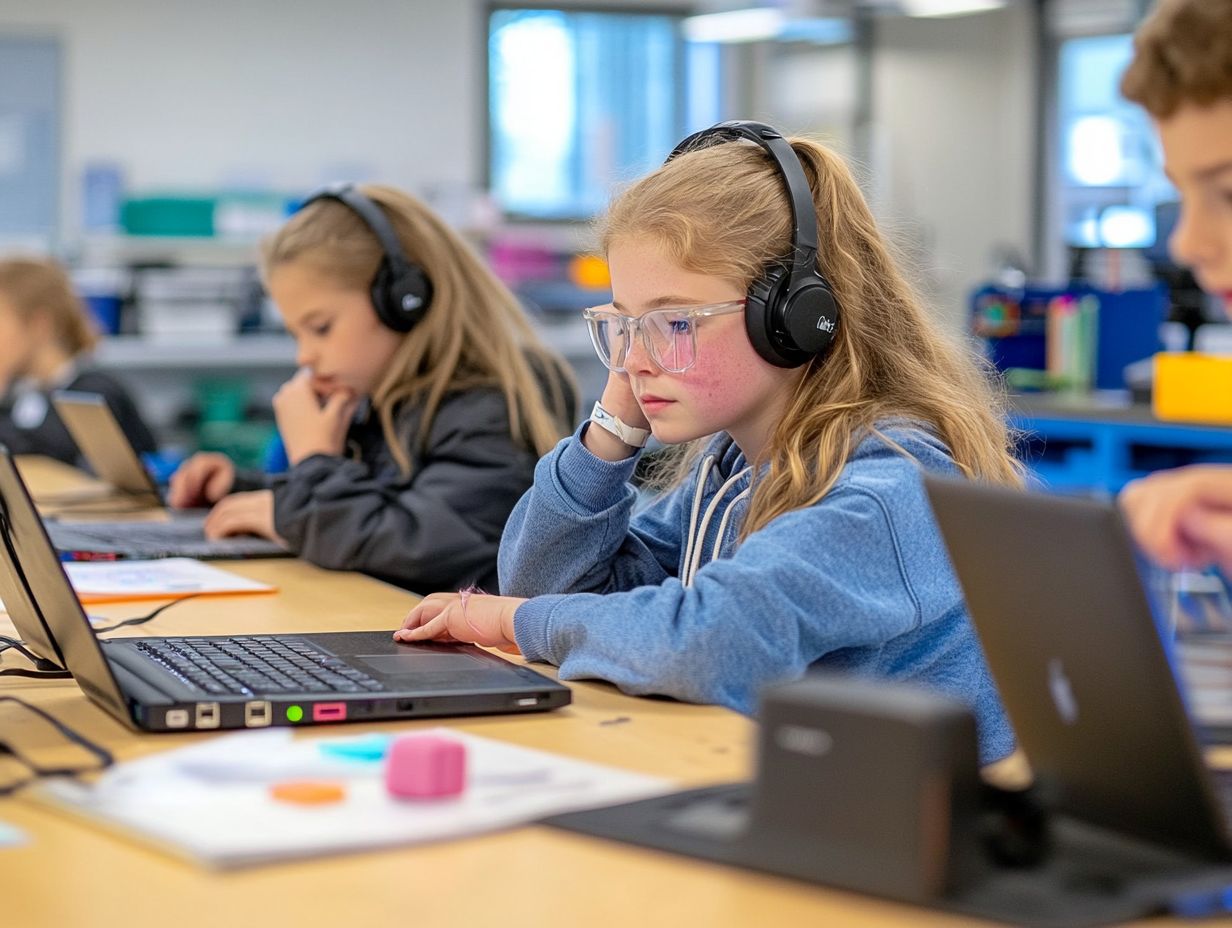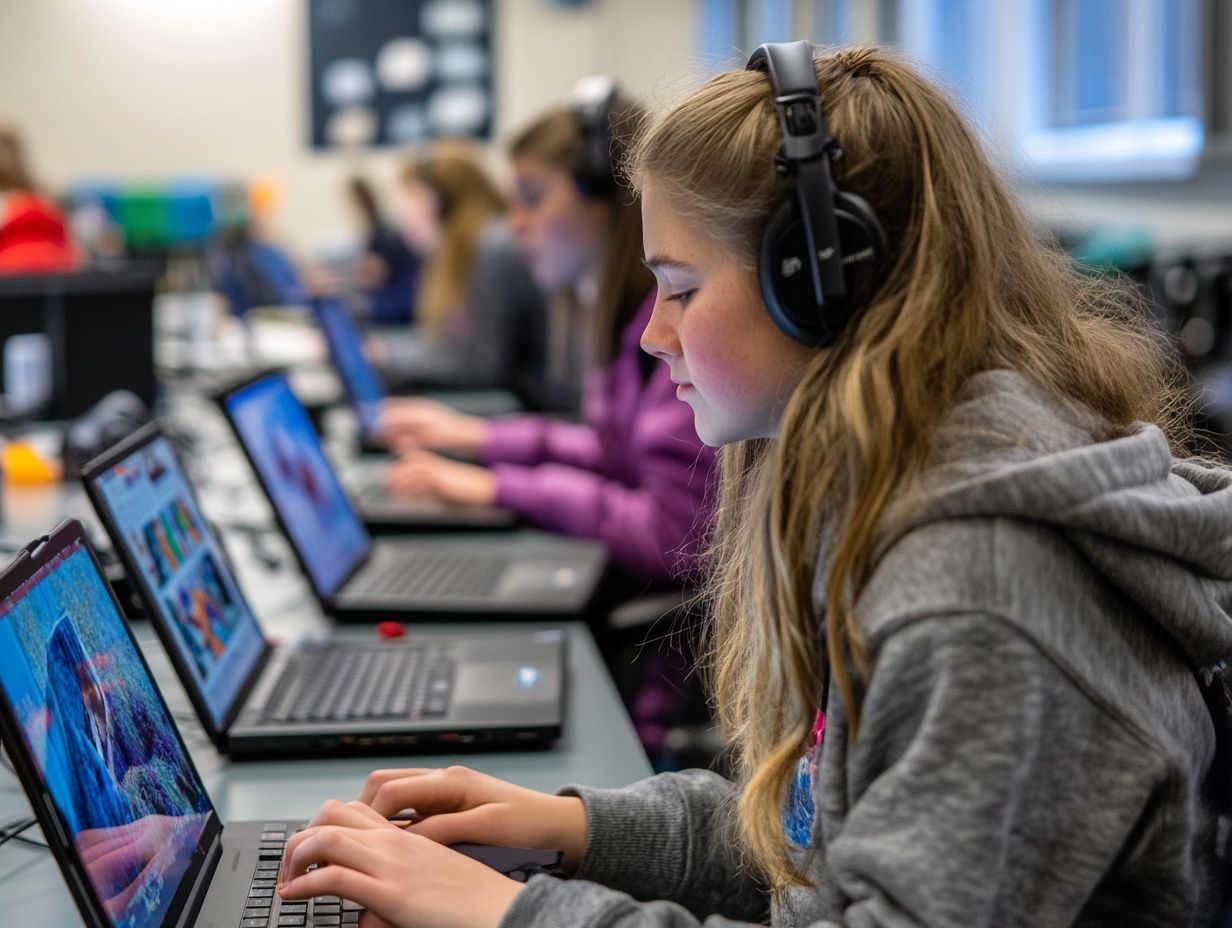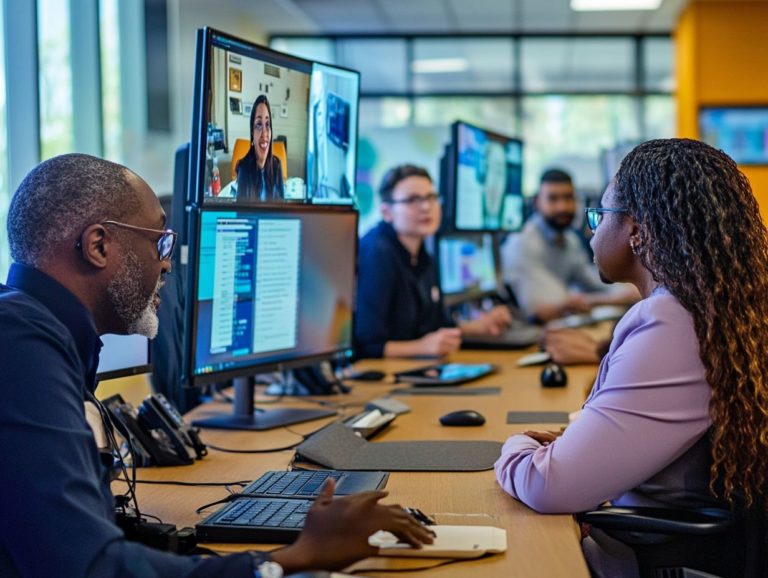5 Online Bachelor’s Degrees That Offer Hands-On Experience
In today s swiftly changing job market, the demand for practical skills to complement book learning has never been more pronounced.
While online education provides the flexibility many seek, prospective students often ponder how they can acquire the hands-on experience that employers truly value.
This article explores five online bachelor’s degrees that seamlessly integrate practical components, spanning fields from nursing to engineering.
Discover the benefits and challenges of hands-on learning, uncover the career opportunities awaiting graduates, and gain insights into the vital role of practical experience in your educational journey.
Contents
- Key Takeaways:
- 1. Online Bachelor’s Degrees with Hands-On Components
- 2. Bachelor of Science in Nursing
- 3. Bachelor of Science in Computer Science
- 4. Bachelor of Science in Education
- 5. Bachelor of Science in Engineering
- 6. Is Hands-On Experience Necessary for an Online Bachelor’s Degree?
- What Are the Alternatives for Gaining Hands-On Experience in an Online Degree?
- How Can an Online Degree with Hands-On Experience Benefit a Student’s Future Career?
- What Are the Top Online Bachelor’s Degrees for Hands-On Experience?
- What Are the Common Misconceptions About Online Degrees with Practical Experience?
- 6. Bachelor of Arts in Liberal Arts
- 7. Bachelor of Science in Psychology
- 8. Bachelor of Science in Criminal Justice
- Frequently Asked Questions
- What are the top 5 online bachelor’s degrees that offer hands-on experience?
- How does a Business Administration degree provide hands-on experience in an online setting?
- Can I earn a nursing degree online and still receive hands-on experience?
- What types of hands-on experience can I expect from a Criminal Justice degree program online?
- Is it possible to gain hands-on experience in computer science through an online bachelor’s degree?
- How do online education degree programs provide hands-on experience for aspiring teachers?
Key Takeaways:

Hands-on experience is crucial in an online bachelor’s degree. It allows students to apply their skills in real-world settings.
Online nursing, computer science, education, and engineering degrees offer hands-on components that provide practical learning opportunities.
Gaining hands-on experience in your online degree can lead to a successful and fulfilling career in various industries.
1. Online Bachelor’s Degrees with Hands-On Components
Online bachelor’s degrees that include hands-on components offer a great mix of flexibility and practical experience. These programs let you not only learn but also apply what you’ve learned in real-world situations.
When you engage in these experiential learning opportunities, your educational journey transforms. You grasp concepts while applying them in real-world scenarios.
Programs from accredited institutions like Ashford University and Southern New Hampshire University excel in this area, integrating internships, lab work, or virtual simulations into their curriculum. These experiences deepen your understanding and align closely with your career aspirations.
By prioritizing programs that emphasize practical experience, you can confidently navigate your education with less student loan debt and clearer pathways to fulfilling graduation requirements. This ultimately enhances your professional readiness and financial stability.
2. Bachelor of Science in Nursing
The Bachelor of Science in Nursing (BSN) is a prestigious program designed to prepare you for a successful career in healthcare. Online nursing degrees seamlessly integrate hands-on experience.
These programs emphasize practical learning through advanced clinical simulations realistic training exercises that mimic real-life situations and required practicums. This approach allows you to apply your skills effectively.
As a result, you ll master nursing procedures and be well-prepared to navigate the complexities of modern healthcare environments. Upon completing the program, you ll find diverse career paths available to you, including opportunities in healthcare management, clinical nursing, and specialized fields like pediatrics or geriatrics.
With the healthcare sector evolving rapidly, now is the perfect time to invest in your nursing degree for a rewarding career ahead!
3. Bachelor of Science in Computer Science
A Bachelor of Science in Computer Science is a fantastic choice for those venturing into the tech field. Many online computer science degrees provide hands-on experience that enriches your learning and prepares you for the workforce.
These programs often feature coding projects and virtual labs, allowing you to practice real-world problem-solving while developing applications. Many institutions also offer internships that connect you with leading tech companies, giving you invaluable hands-on experience.
As you transition into the workforce, you’ll find diverse opportunities awaiting you, from software engineering to network security, with median salaries in the tech industry frequently surpassing six figures.
This degree not only opens doors to lucrative positions but also acts as a springboard for pursuing advanced online degrees in specialized fields, further amplifying your career prospects.
4. Bachelor of Science in Education
A Bachelor of Science in Education equips you as an aspiring educator through comprehensive online education degrees that emphasize hands-on experience essential for effective teaching in K-12 settings.
These programs don t just skim the surface of educational theories; they immerse you in practical teaching experiences that align with graduation requirements. This allows you to cultivate the essential skills needed for success in the classroom.
Graduates holding an education degree have plentiful career opportunities, spanning various roles within the educational sector.
With innovative student teaching placements and engaging virtual simulations, these online degrees ensure that you not only learn the material but also apply it in real-world scenarios. This blend of book knowledge and practical experience is crucial, as employers often seek candidates who can demonstrate effective classroom management and instructional strategies.
As a graduate, you can explore diverse career paths such as:
- Classroom teachers – Inspire and educate students in a traditional classroom setting.
- Special education advocates – Support students with special needs and their families.
- Educational consultants – Provide expert advice to schools on curricular and administrative issues.
Ultimately, the combination of hands-on training with academic study enriches your learning journey and significantly boosts your employability in a competitive job market.
5. Bachelor of Science in Engineering
Get ready for an exciting journey with a Bachelor of Science in Engineering! If you love solving problems and exploring innovative technology, this is the path for you.
With online engineering degrees that blend theory and practice, you’ll gain hands-on experience that is crucial for grasping complex engineering principles.
These programs offer a rich combination of virtual labs, collaborative projects, and internship opportunities, allowing you to apply book knowledge in real-world scenarios. Whether you choose to dive into fields like environmental, aerospace, or computer engineering, you ll tackle genuine challenges that promote critical thinking and spur innovation.
This hands-on learning will not only hone your technical skills but also boost your employability, as employers increasingly seek candidates with practical experience.
Take charge of your future today! With median pay for engineers often surpassing $80,000 annually, now is the perfect time to step into this vibrant field.
6. Is Hands-On Experience Necessary for an Online Bachelor’s Degree?

The necessity of hands-on experience in online bachelor s degrees sparks considerable debate. Many argue that practical application is essential for genuinely grasping course material and boosting motivation to learn.
While traditional education often emphasizes hands-on components, online formats are evolving to incorporate alternative methods that cater to diverse learning styles. These innovations play a vital role in preparing you for job opportunities by bridging the gap between book knowledge and real-world application.
In this landscape, integrating experiences like virtual labs, simulations, or field projects can be particularly advantageous for you. These alternatives provide a practical way to engage with course concepts, fostering a deeper understanding and better retention of knowledge.
For example, virtual labs can replicate complex scientific experiments, enabling you to experiment and observe outcomes without the constraints of physical resources. With field projects, you can apply what you’ve learned to real-world scenarios, enhancing your resume and making you more appealing to potential employers.
While these methods may not entirely replace traditional hands-on experiences, they certainly offer a viable pathway for you to gain practical skills in a flexible online learning environment.
What Are the Alternatives for Gaining Hands-On Experience in an Online Degree?
For students pursuing online degrees, a wealth of alternatives awaits for gaining practical experience, which complements your theoretical learning with practical applications.
Options like virtual labs, project-based assignments, and internships effectively simulate real-world scenarios, empowering you to develop essential skills that are directly relevant to your fields of study.
These alternatives prove especially advantageous in online formats where traditional hands-on experiences may not be feasible.
Programs incorporating virtual labs, particularly in STEM fields, enable you to conduct experiments in a simulated environment, helping you understand better complex concepts.
Project-based assignments also encourage collaboration and creativity, mirroring the dynamics of real-world teams.
Many institutions offer remote internships, connecting you with industry professionals. This experience is invaluable for networking and gaining firsthand insights into your chosen profession.
These exciting options can really boost your learning experience, enhancing your career readiness and marketability. They give you a distinct competitive edge in the ever-evolving job market.
How Can an Online Degree with Hands-On Experience Benefit a Student’s Future Career?
An online degree paired with hands-on experience can significantly elevate your career prospects by equipping you with practical skills that are in high demand in today’s job market.
These programs empower you to apply theoretical knowledge in real-world scenarios while enabling you to build a portfolio that showcases your competencies to potential employers.
This hands-on approach is essential for distinguishing yourself in a competitive job landscape, opening doors to a broader range of job opportunities.
Employers increasingly seek candidates who can adapt and apply their learning in actual work environments. Recent surveys reveal that 70% of hiring managers prioritize experience over academic accolades, underscoring the importance of practical skills.
Graduates often find that their real-world projects not only refine their technical abilities but also cultivate soft skills like teamwork and problem-solving qualities vital in any workplace.
Take, for example, a graduate from an online engineering program who shared how her hands-on projects played a pivotal role in landing a position at a leading tech firm. She credited her unique portfolio as a key factor in her hiring, demonstrating the tangible benefits of combining education with practical experience.
What Are the Top Online Bachelor’s Degrees for Hands-On Experience?
Several online bachelor’s degrees distinguish themselves through a strong emphasis on hands-on experience, such as the popular online bachelor’s degrees in business, ensuring you gain practical skills alongside your academic knowledge.
Accredited institutions like Arizona State University and Purdue University Global offer programs that seamlessly incorporate experiential learning, making them excellent choices for those seeking degrees with real-world applications.
Fields such as nursing, computer science, and engineering shine for their innovative hands-on components.
For instance, the nursing program at Arizona State integrates clinical placements with virtual simulations, allowing you to navigate patient care scenarios in a controlled environment.
Purdue University Global s computer science degree features collaborative projects with tech companies, providing you with opportunities to work on real-life applications.
In engineering, partnerships with local industries ensure that you engage in projects that reflect the challenges faced in the field today.
These approaches collectively equip you with not only theoretical knowledge but also the practical expertise that employers highly value.
What Are the Common Misconceptions About Online Degrees with Practical Experience?
Despite the growing popularity of online degrees, misconceptions about their quality and effectiveness still linger among prospective students.
You may think that online programs lack the rigorous, practical components found in traditional settings. This belief could hold you back from exploring valuable educational opportunities.
In reality, many accredited institutions have embraced innovative solutions to ensure that meaningful practical learning experiences are available, tailored to fit various learning styles.
For instance, institutions like the University of Southern California and Western Governors University have designed hybrid programs that seamlessly blend online coursework with essential field experiences.
These programs require you to engage in internships and practical projects, allowing you to apply theoretical knowledge in real-world environments. Such initiatives enhance your educational journey and demonstrate that online degrees can provide practical training that rivals traditional programs.
Additionally, online laboratories and simulations offer engaging, interactive learning opportunities that effectively bridge the gap between theory and practice.
6. Bachelor of Arts in Liberal Arts
A Bachelor of Arts in Liberal Arts is an enriching journey that emphasizes critical thinking, creativity, and communication skills. It is a versatile option for anyone pursuing an online degree in this field.
This program offers a broad understanding of social sciences, preparing you for diverse career opportunities across multiple sectors. The flexible nature of liberal arts programs allows you to tailor your education to your personal interests and career aspirations.
As you engage with various courses, you ll deepen your understanding of human culture and society while honing essential skills that are applicable in many job markets.
You may find yourself well-equipped for fulfilling roles such as:
- Public relations specialists: Communicate effectively.
- Social workers: Foster empathy and cultural insights.
The analytical and problem-solving abilities you gain can be leveraged in fields like marketing, education, or public policy, making a liberal arts degree a valuable asset in today s dynamic professional landscape.
How Can an Online Liberal Arts Degree Provide Practical Experience?

An online liberal arts degree offers invaluable practical experience through project-based learning and internships, allowing you to apply your knowledge in real-world environments. These experiential learning opportunities equip you with relevant skills that significantly enhance your employability upon graduation.
By engaging in practical projects, you deepen your understanding of human behavior and social dynamics, effectively bridging the gap between theory and practice.
Many programs feature specialized courses in areas like digital communications or community organizing, where you collaborate with local organizations to create meaningful initiatives. Internships place you in professional environments, enabling you to apply learned theories while gaining critical insights into workplace dynamics.
Collaborative projects, often facilitated through online platforms, foster teamwork and critical thinking essential skills for navigating the diverse challenges in your career. These experiences will strengthen your resume and help you build important networks and confidence, better preparing you for the competitive job market.
What Are the Career Opportunities for Graduates of an Online Liberal Arts Degree?
Graduates of an online liberal arts degree find themselves with a wealth of career opportunities, thanks to the versatile skills they’ve honed in critical thinking and communication. This broad skill set positions you as an attractive candidate in various job markets, including public relations, education, and social work.
The adaptability of a liberal arts education gives you the power to navigate multiple career paths with ease. The demand for marketing, human resources, and tech professionals is rising, with job growth projected at 8% over the next decade.
Many industries greatly value the creative problem-solving abilities and effective interpersonal communication skills that you possess. While salary ranges for entry-level positions can vary significantly, those with a liberal arts background typically earn between $40,000 and $60,000 annually.
As you advance in your career, your potential earnings can soar into six figures. Such financial prospects make choosing a liberal arts degree an enticing option for many.
7. Bachelor of Science in Psychology
A Bachelor of Science in Psychology is a fantastic choice if you’re keen on unraveling the complexities of human behavior. Many online psychology degrees provide valuable insights into mental processes and emotional well-being.
These programs usually encompass essential psychological concepts such as developmental psychology, cognitive processes, and social behavior. They also include rigorous training in research methodologies that are vital for practical applications.
As a graduate, you’ll discover exciting career opportunities as case managers, counselors, or in roles such as human resources and rehabilitation specialists. With the median pay for counselors sitting around $47,000 per year and case managers slightly higher at about $51,000, the financial prospects in these fields are appealing.
Pursuing an online psychology degree is not just smart; it’s exciting and rewarding!
How Can an Online Psychology Degree Provide Hands-On Experience?
An online psychology degree can offer you hands-on experience through internships and research projects, allowing you to apply theoretical knowledge to real-world situations. These opportunities enable you to collaborate with professionals in the field, gaining practical insights that deepen your understanding of human behavior.
These experiences help you build a competitive edge in the job market and prepare for advanced studies in psychology or related disciplines. Many programs incorporate practicum placements, where you engage in supervised clinical practice, providing invaluable exposure to diverse settings like mental health clinics or educational environments.
Collaborative research initiatives often invite you to contribute to studies that explore various psychological phenomena. This enhances your critical thinking and analytical skills while refining your technical abilities.
By immersing yourself in these experiences, you also expand your professional network, ultimately boosting your employability and readiness for future roles in the psychology field.
What Are the Career Opportunities for Graduates of an Online Psychology Degree?
Graduates of an online psychology degree open the door to a diverse array of career opportunities, spanning areas like social work, counseling, and the nonprofit sector. This degree provides important skills to understand and address human behavior, making you a valuable asset in various professional settings.
As organizations increasingly acknowledge the importance of mental health and well-being, the demand for psychology graduates is anticipated to grow. For instance, social workers are pivotal in supporting individuals and families, often working with vulnerable populations.
With over 100,000 new social work jobs projected to emerge by 2030, this path is not only rewarding but also offers a median annual salary of around $51,760, making it an attractive choice.
Counseling positions, including roles such as school and mental health counselors, are also on the rise, with a projected increase of 25% over the next decade. This surge reflects society’s growing emphasis on emotional health.
Armed with a psychology degree, you can expect an annual median salary of approximately $57,000, combining promising financial rewards with the opportunity to significantly impact people’s lives.
8. Bachelor of Science in Criminal Justice
A Bachelor of Science in Criminal Justice offers you a solid understanding of the justice system. Many online degrees incorporate hands-on experience in essential areas like forensic science, which is the study of scientific methods used to solve crimes, and law enforcement.
This degree equips you for a range of career opportunities, including criminal justice administration and forensic analysis. With the growing emphasis on public safety, you will find yourself well-prepared to step into a dynamic and rewarding field.
Many programs also include practical experiences such as internships, allowing you to apply theoretical knowledge in real-world settings. Engaging with case studies can further sharpen your critical thinking and problem-solving skills, both of which are vital in this arena.
With such experiences under your belt, you might consider careers as:
- Probation officers
- Crime scene investigators
- Detectives
The job market is booming with exciting opportunities, fueled by increased investment in community safety initiatives and evolving technology. This ensures a steady demand for qualified criminal justice professionals like yourself.
How Can an Online Criminal Justice Degree Provide Hands-On Experience?

An online criminal justice degree offers the chance to gain hands-on experience through internships and practical training. This effectively bridges the gap between theoretical knowledge and real-world applications.
These opportunities allow you to engage directly with professionals in the field, providing valuable insights into the complexities of the justice system. This significantly enhances your employability upon graduation. Such experiences are crucial if you aspire to work in law enforcement or forensic science.
Alongside internships, many programs include practical projects that simulate real-world scenarios. This allows you to tackle case studies, participate in mock trials, or analyze crime scene investigations.
This dynamic approach deepens your understanding of criminal procedures while sharpening your critical thinking and problem-solving skills.
The networking opportunities that arise during these experiences can lead to meaningful connections with industry professionals. These connections provide guidance and potential job leads.
Ultimately, these hands-on experiences cultivate a well-rounded educational foundation. They equip you with the confidence and competence needed to thrive in various roles within the justice system.
What Are the Career Opportunities for Graduates of an Online Criminal Justice Degree?
Graduates of an online criminal justice degree program can explore a myriad of exciting career opportunities within the justice system. This includes law enforcement, crime analysis, and forensic science. The knowledge and skills you gain through these programs will position you as a valuable contributor to public safety and criminal justice initiatives.
With the demand for qualified professionals in this field on the rise, you are poised to secure a rewarding career. You can choose from various career paths that allow you to specialize in areas like corrections, homeland security, and investigative services, showcasing a diverse range of potential roles.
According to the U.S. Bureau of Labor Statistics, employment in the criminal justice sector is projected to grow by approximately 5% over the next decade. This growth is expected to outpace many other professions. For instance, police officers earn a median annual wage of around $67,290, while forensic science technicians enjoy a median pay of about $60,590.
These promising statistics underscore the ample opportunities available for those who are passionate about contributing to societal safety and justice.
Frequently Asked Questions
What are the top 5 online bachelor’s degrees that offer hands-on experience?
Here are the top 5 online bachelor’s degrees with hands-on experience: 1) Business Administration, 2) Nursing, 3) Criminal Justice, 4) Computer Science, and 5) Education. For more options, check out 5 online universities offering unique bachelor’s degrees.
How does a Business Administration degree provide hands-on experience in an online setting?
Business Administration degree programs often include real-world case studies, group projects, and internship opportunities. These elements provide students with hands-on experience in areas such as management, finance, and marketing.
Can I earn a nursing degree online and still receive hands-on experience?
Yes! Many online nursing programs include simulations and virtual labs. They also offer clinical rotations at local healthcare facilities, giving students real-world experience.
What types of hands-on experience can I expect from a Criminal Justice degree program online?
A Criminal Justice program may provide hands-on experience through internships and mock crime scenes. You can also participate in fieldwork opportunities with local law enforcement or legal organizations.
Is it possible to gain hands-on experience in computer science through an online bachelor’s degree?
Absolutely! Computer science programs often feature hands-on projects and virtual labs. This helps students gain practical skills in coding and programming.
How do online education degree programs provide hands-on experience for aspiring teachers?
Online education programs typically include student teaching experiences in local schools. This allows students to apply their knowledge in real classrooms under the supervision of a mentor teacher.






